Capital Buzz/Virendra Kapoor
Bachchan in the red
 Contrary to the widespread impression that Amitabh Bachchan
made huge profits from hosting the Miss World
show in Bangalore, people close to him swear that when all
the sums are added up, ABCL will incur a huge loss.
Contrary to the widespread impression that Amitabh Bachchan
made huge profits from hosting the Miss World
show in Bangalore, people close to him swear that when all
the sums are added up, ABCL will incur a huge loss.
Not because Amitabh
had not done his sums right when he decided to bring the beauty
pageant to these shores. His calculations went awry thanks to
the shrill protests of assorted feminist groups and the determined
legal battle they fought to stall the event till the very last moment.
Bachchan had also not reckoned that he would be called upon
to pay Rs 20 million for the security arrangements alone. He had assumed,
not without reason, that with Prime Minister H D Deve Gowda
and Karnataka Chief Minister J H Patel
blessing his project to showcase Bangalore under the aegis
of the Miss World extravaganza, he would get security and other
facilities gratis.
But the protracted protests and the courts's directives
in public interest litigation forced the Karnataka
government on the back foot. Bangalore Police Commissioner
S C Burman forced Bachchan to pay Rs 20.5 million hours before
the show began at the threat of withdrawal of
all police and paramilitary forces and the closure of the Chinnaswamy
stadium.
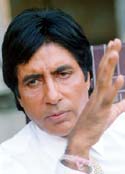 Bachchan's repeated pleas to the police chief that
he stood 'personal guarantee' and the payment would be made after
the show, had no effect. Also, contrary to media reports, there
were not many takers for the Rs 25,000 tickets in the diamond
enclosure. Most were invitees, including some well-
known businessmen who had flown in their company aircraft to
witness the event.
Bachchan's repeated pleas to the police chief that
he stood 'personal guarantee' and the payment would be made after
the show, had no effect. Also, contrary to media reports, there
were not many takers for the Rs 25,000 tickets in the diamond
enclosure. Most were invitees, including some well-
known businessmen who had flown in their company aircraft to
witness the event.
Bachchan has the option to host the show for the next two years.
Even if he does so, it will be in the Seychelles and
not in India.
Caught in the act!
A Kashmiri militant leader on a
visit to the federal capital was recently caught in an embarrassing situation by
the Delhi police while in the company of a woman television reporter.
Seeing the two making it out openly behind the trees on
the lawns of Rajpath off India Gate, a hawker peddling peanuts
summoned cops from the police post in the vicinity.
The cops unaware of the Kashmiri separatist's identity did what comes
best to them -- try to extract money at the pain of registering
a case of indecent behaviour in public. But little did they know
that the militant leader was being watched by their cousins from
the Intelligence Bureau. The sleuths scrapped openly. The local
police wanted to book the couple, the gumshoes in mufti wanted
them let off.
By the time the cops took the couple to the police station,
the IB chaps had spoken to their superiors who managed
to have the revolutionary fighting for Kashmir's independence
let off with an oral warning.
Shaking off hawala charges
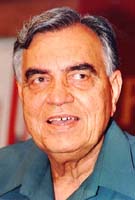 A move is afoot to bury the hawala cases against politicians
a million fathoms deep. The government is seriously examining
a proposal to amend the Anti-Corruption Act with retrospective
effect in order to take members of Parliament out of
its ambit.
A move is afoot to bury the hawala cases against politicians
a million fathoms deep. The government is seriously examining
a proposal to amend the Anti-Corruption Act with retrospective
effect in order to take members of Parliament out of
its ambit.
A former Congress leader from Madhya Pradesh, who
is charged in the case, is exerting his considerable energies
to help evolve an all-party consensus on the issue. There is a good
chance that even Mulayam Singh Yadav's
Samajwadi Party and the Communists may support the move.
His lawyers have convinced the MP leader that equity and fair play demanded
that MPs should not be made to suffer from
double jeopardy. MPs were brought under the purview of
the Anti-Corruption Act in the late eighties. Before that it
was believed an errant MP could be punished by the presiding
officer of the House of which he was a member.
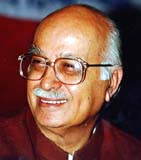 The hawala victims club has another reason to plead for its rescue
by Parliament. It is pointed out that whereas for the prosecution
of all public servants, including lowly peons, under the Anti-
Corruption Act, advance sanction from the relevant government
authority is necessary, in the case of MPs, the police requires
no such permission from the presiding officers of either House
of Parliament. These arguments were marshalled by a leading Supreme
Court lawyer at the express desire of a hawala victim.
The hawala victims club has another reason to plead for its rescue
by Parliament. It is pointed out that whereas for the prosecution
of all public servants, including lowly peons, under the Anti-
Corruption Act, advance sanction from the relevant government
authority is necessary, in the case of MPs, the police requires
no such permission from the presiding officers of either House
of Parliament. These arguments were marshalled by a leading Supreme
Court lawyer at the express desire of a hawala victim.
Surprisingly, a few days later almost an identical case was made
by a couple of former Madhya Pradesh high court judges under
their names in an article in a Delhi newspaper. Should the move
succeed, the hawala accused who were mere MPs
when they allegedly took money from the Jain brothers might
get off the hook.
Those who were ministers at the time when they allegedly
received hawala funds might not be as lucky
because in their case the provision for seeking prior permission
for their prosecution is already in place.
A divided CBI
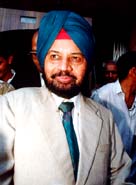 In spite of periodic rebukes by the courts, the Central
Bureau of Investigation shows no inclination to change its ways.
CBI Director Joginder Singh changes at will investigating
officers in politically sensitive cases.
In spite of periodic rebukes by the courts, the Central
Bureau of Investigation shows no inclination to change its ways.
CBI Director Joginder Singh changes at will investigating
officers in politically sensitive cases.
The officers in the Bihar
fodder scam and the Assam letter of credit scam were changed mid-
way recently because they would not abandon the trail which led
to the doorsteps of the chief ministers of these states.
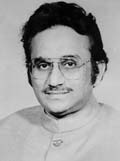 According to insiders the CBI is divided down the line between those loyal
to Singh and those opposed to him. In the recent raids on
the homes of former federal minister, Krishna Kumar, the CBI team
went all the way to Kerala to pry into his various investments,
but did not take into account the plush farm Krishna Kumar has acquired
in the millionaire's row in Bijwasan in south Delhi, a stone's
throw away from the international airport. This when half the
CBI knew about the former minister's farm for a long time!
According to insiders the CBI is divided down the line between those loyal
to Singh and those opposed to him. In the recent raids on
the homes of former federal minister, Krishna Kumar, the CBI team
went all the way to Kerala to pry into his various investments,
but did not take into account the plush farm Krishna Kumar has acquired
in the millionaire's row in Bijwasan in south Delhi, a stone's
throw away from the international airport. This when half the
CBI knew about the former minister's farm for a long time!
|





 Contrary to the widespread impression that Amitabh Bachchan
made huge profits from hosting the Miss World
show in Bangalore, people close to him swear that when all
the sums are added up, ABCL will incur a huge loss.
Contrary to the widespread impression that Amitabh Bachchan
made huge profits from hosting the Miss World
show in Bangalore, people close to him swear that when all
the sums are added up, ABCL will incur a huge loss.
 Bachchan's repeated pleas to the police chief that
he stood 'personal guarantee' and the payment would be made after
the show, had no effect. Also, contrary to media reports, there
were not many takers for the Rs 25,000 tickets in the diamond
enclosure. Most were invitees, including some well-
known businessmen who had flown in their company aircraft to
witness the event.
Bachchan's repeated pleas to the police chief that
he stood 'personal guarantee' and the payment would be made after
the show, had no effect. Also, contrary to media reports, there
were not many takers for the Rs 25,000 tickets in the diamond
enclosure. Most were invitees, including some well-
known businessmen who had flown in their company aircraft to
witness the event.
 A move is afoot to bury the hawala cases against politicians
a million fathoms deep. The government is seriously examining
a proposal to amend the Anti-Corruption Act with retrospective
effect in order to take members of Parliament out of
its ambit.
A move is afoot to bury the hawala cases against politicians
a million fathoms deep. The government is seriously examining
a proposal to amend the Anti-Corruption Act with retrospective
effect in order to take members of Parliament out of
its ambit.
 The hawala victims club has another reason to plead for its rescue
by Parliament. It is pointed out that whereas for the prosecution
of all public servants, including lowly peons, under the Anti-
Corruption Act, advance sanction from the relevant government
authority is necessary, in the case of MPs, the police requires
no such permission from the presiding officers of either House
of Parliament. These arguments were marshalled by a leading Supreme
Court lawyer at the express desire of a hawala victim.
The hawala victims club has another reason to plead for its rescue
by Parliament. It is pointed out that whereas for the prosecution
of all public servants, including lowly peons, under the Anti-
Corruption Act, advance sanction from the relevant government
authority is necessary, in the case of MPs, the police requires
no such permission from the presiding officers of either House
of Parliament. These arguments were marshalled by a leading Supreme
Court lawyer at the express desire of a hawala victim.
 In spite of periodic rebukes by the courts, the Central
Bureau of Investigation shows no inclination to change its ways.
CBI Director Joginder Singh changes at will investigating
officers in politically sensitive cases.
In spite of periodic rebukes by the courts, the Central
Bureau of Investigation shows no inclination to change its ways.
CBI Director Joginder Singh changes at will investigating
officers in politically sensitive cases.
 According to insiders the CBI is divided down the line between those loyal
to Singh and those opposed to him. In the recent raids on
the homes of former federal minister, Krishna Kumar, the CBI team
went all the way to Kerala to pry into his various investments,
but did not take into account the plush farm Krishna Kumar has acquired
in the millionaire's row in Bijwasan in south Delhi, a stone's
throw away from the international airport. This when half the
CBI knew about the former minister's farm for a long time!
According to insiders the CBI is divided down the line between those loyal
to Singh and those opposed to him. In the recent raids on
the homes of former federal minister, Krishna Kumar, the CBI team
went all the way to Kerala to pry into his various investments,
but did not take into account the plush farm Krishna Kumar has acquired
in the millionaire's row in Bijwasan in south Delhi, a stone's
throw away from the international airport. This when half the
CBI knew about the former minister's farm for a long time!